VIPS in California during the 1800s
The Vicar of Bray
That is an unusual name for a ship given that The Vicar of Bray is a satirical description of an individual changing his principles to remain in ecclesiastical office as external requirements change around him. A vicar (Simon Aleyn) appointed to the parish of Bray in Berkshire during Henry VIII's reign changed his faith to Catholic when Mary 1 as on the throne and back to Protestant when Elizabeth I succeeded, and so retained his living.
March 7, 1886, Daily Alta California, San Francisco, California, U.S.A.
A Kinsman of the Vicar of Bray.
Washington Letter to Cleveland Leader
The army society of the capital is made up of toadies, and even the highest in rank among the officers do not scruple to change their affections with the various administrations. One of the old standbys of Washington society is General Van Vliet. You will find him at every grand reception, at nearly every big dinner, and you may have heard the story of how General Sherman, who is nearly as great a dinner-goer as General Van Vliet, on forgetting the place at which he was invited to dinner one night, saw Van Vliet passing his house in full dress, and followed him, being sure that he would lead him to the right place, and was not disappointed. Well, during Arthur's administration the General was a leading figure, as he is now. He was a strong Republican, and every one is now surprised to see him so close in with the Democrats. Still, every one likes Van Tliet, and an army officer should have no politics. But to my story. The day after Cleveland was inaugurated General Van Tliet appeared at the White House, and began to instruct, in the presence of others, Colonel Lamont as to how he and the President should carry on the administration, especially in the social way. After he had gone on at some length, one of the bystanders, who was a statesman of some prominence, spoke up:
"And pray how long have you, been a Democrat, General Van Vliet?"
"Since yesterday noon, sir," was the reply.
San Francisco Call, March 26, 1893, San Francisco, California
UNEASY CLERKS.
The Shadow of the Headsman Haunts
the New City Hall.
There are any number of clerks in the new City Hall who have survived the change of civic administration, but who are just now feeling their heads anxiously every morning to make sure they have not been chopped off overnight.
It is rumored with increasing pertinaclty that the sons of the Democracy who tramped so many weary miles over the cobblestones during the last campaign are putting pressure on the city dads to make a clean sweep of the Republican clerks who still hold the fort in departments which have otherwise undergone sweeping changes.
The great unterrified are even talking in no gentle tones of applying the Jacksonian principle, "To the victors belong the spoils," to no less a person than Clerk Russell himself. Now it is freely admitted that the Board of Supervisors of both political parties have recognized Mr. Russell's rare merits by keeping him In office as their clerk term after term, and, in fact, Mr. Russell has survived as ninny changes of party as the historic Vicar of Bray. But the Democratic spirit is abroad, and it is claimed that there never was a place yet that a competent party man could not be found to fill.
Another nice position which the Democratic workers have their eye on is the deputy clerkship now held by William A. Deane under M. C. Haley. Deane is a brother-in-law of M. H. de Young. The means and influence by which he was appointed were precisely such as might be expected, and certainly are not likely to save the young man's neck from the ax, though he is well liked personally.
Lewis Cohen, one of the oldest clerks In the Justices' clerks' office, where he holds a position as "extra" at Sioo a month, is likely to lose his Job. At a meeting of the Finance Committee of the Board of Supervisors yesterday It was resolved to recommend that the position be abolished. The matter will come up before the Supervisors at the meeting on Monday evening, but Cohen's friends have little hope of obtaining a respite.
San Francisco Call, September 3, 1911
A HOSPITABLE APPETITE
It is characteristic that when it seemed necessary, or at least serviceable, to excuse or apologize for stealing the United States senatorship these reformers of commerce went to the dirty work with eager appetite. It was quite superfluous, but they seemed to like it. I could forgive a man who says, "This is politics. We've got the votes and we mean to take what we want, right or wrong," but I have nothing but contempt for the political pickpocket who turns up his eyes to heaven and snuffles out a labored exposiiton of the purity of his motives. It is a meaner office to play hypocrite than thief.
These are the lineal descendants of the celebrated Vicar of Bray, who, as Disraeli says, was Catholic in the time of Henry VIII until the reformation; in the reign of Edward VI he was Calvinist; in the reign of Mary became Catholic once more, and when Elizabeth was queen he turned Protestant again. 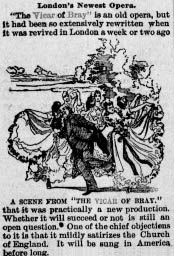 No matter who was king he resolved to die Vicar of Bray. He had the impartial and hospitable stomach of the modern reformer of commerce, always ready for a dish of crow.
No matter who was king he resolved to die Vicar of Bray. He had the impartial and hospitable stomach of the modern reformer of commerce, always ready for a dish of crow.
In the song, "The Vicar of Bray," the eponymous vicar was the clergyman of the parish of Bray-on-Thames, Berkshire.
A comic opera covers a later period in 18th century history, while a film set in Bray, County Wicklow, in Ireland, covers Charles I, the English Civil War, the Commonwealth of England, The Protectorate, and restoration of Charles II.
The most familiar version of the lyrics recount his adaptability (some would say amorality) over half a century, from the reigns of Charles II to George I. Over this period, he embraced whichever form of liturgy, Protestant or Catholic, was favoured by the monarch of the day in order to retain his position as vicar of Bray. The following lyric is a version of the song recorded by Richard Dyer-Bennet in 1955:
In good King Charles' golden time, when loyalty no harm meant,
A zealous high churchman was I, and so I gained preferment.
To teach my flock, I never missed: Kings are by God appointed
And damned are those who dare resist or touch the Lord's annointed.(Chorus)

And this be law, that I'll maintain until my dying day, sir
That whatsoever king may reign, Still I'll be the Vicar of Bray, sir.
When royal James possessed the crown, and popery came in fashion,
The penal laws I hooted down, and read the Declaration.
The Church of Rome, I found, did fit full well my constitution
And I had been a Jesuit, but for the Revolution.When William was our King declared, to ease the nation's grievance,
With this new wind about I steered, and swore to him allegiance.
Old principles I did revoke; Set conscience at a distance,
Passive obedience was a joke, a jest was non-resistance.When Royal Anne became our queen, the Church of England's glory,
Another face of things was seen, and I became a Tory.
Occasional conformists base; I blamed their moderation;
And thought the Church in danger was from such prevarication.When George in pudding time came o'er, and moderate men looked big, sir
My principles I changed once more, and I became a Whig, sir.
And thus preferment I procured From our new Faith's Defender,
And almost every day abjured the Pope and the Pretender.The illustrious house of Hanover and Protestant succession
To these I do allegiance swear - while they can hold possession.
For in my faith and loyalty I never more will falter,
And George my lawful king shall be - until the times do alter.







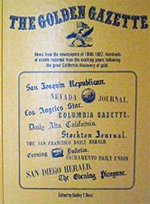
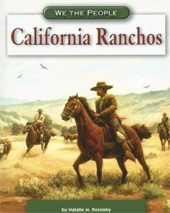
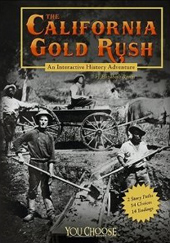



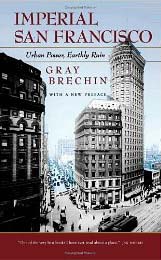

 Copyright ~ 1998-2018.
Copyright ~ 1998-2018. 